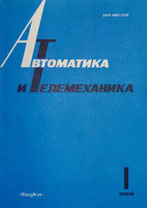|
This article is cited in 1 scientific paper (total in 1 paper)
Control in Technical Systems
Stationary characteristics of an unreliable single-server queueing system with losses and preventive maintenance
A. I. Peschansky
Sevastopol State University, Sevastopol, Russia
Abstract:
This paper considers an unreliable restorable single-server queueing system with losses in which server failures may occur during operation. The random variables describing the system have general distributions. For increasing the efficiency of this system, it is proposed to carry out preventive maintenance of the server as soon as the accumulated operating time exceeds an upper permissible threshold. A semi-Markov model of the system’s evolution over time is constructed. The explicit-form expressions for the final probabilities and mean sojourn times of the system in different physical states are derived using the stationary distribution of the embedded Markov chain. The frequency of preventive maintenance of the server is optimized via maximizing the average specific profit and minimizing the average specific costs of the system.
Keywords:
single-server queueing system with losses, preventive maintenance, stationary distribution of embedded Markov chain, final probabilities of states, stationary characteristics of efficiency.
Citation:
A. I. Peschansky, “Stationary characteristics of an unreliable single-server queueing system with losses and preventive maintenance”, Avtomat. i Telemekh., 2020, no. 7, 95–112; Autom. Remote Control, 81:7 (2020), 1243–1257
Linking options:
https://www.mathnet.ru/eng/at15355 https://www.mathnet.ru/eng/at/y2020/i7/p95
|

|




 Contact us:
Contact us: Terms of Use
Terms of Use
 Registration to the website
Registration to the website Logotypes
Logotypes








 Citation in format
Citation in format 
